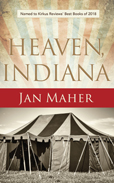
 |
Small town America has been the canvas for countless artists over the years who create art with words rather than paint. In the theatre, Thornton Wilder's Our Town gave audiences a vision of an autonomous village from the inside out. On the page, then later on the screen, Larry McMurtry's The Last Picture Show and Carson McCullers' The Heart Is A Lonely Hunter cut into the very sinew of lives lived within self-inflicted boundaries. Echoes from those works and more reverberate through author Maher's chronicle of a town and its denizens in the Midwest. Hers is a tale, however, that while spiced with the flavor of classics, feels notably original in its depiction of the events and individuals who make up her setting.
Maher begins her story in 1954 and ends it forty years later. Along the way, she manages to examine multiple relationships among a number of the citizens who populate Heaven. The seminal event, though, on which the axis of the narrative turns, is the birth of a child out of wedlock. The baby girl is spirited away by one woman determined to keep gossip and embarrassment at bay. She leaves the infant with a gypsy fortune-teller in a traveling carnival who is prepared to love the child unconditionally and rear her as her own. Eventually, the participants involved will meet again in Heaven, and a series of revelations will unfold that start rumors to swirl, tongues to wag, behavior to change, and consequential decisions to be made.
To capture four decades of life in a small community and not have it feel stiflingly oppressive requires a deft touch plus an ability to create particularly involving characters that come to life on the page. The author succeeds at both requirements as her prose performs both attitudinally and stylistically. Her character development is rich, full, and eschews stereotypes for solid human beings whom we all seem to have run across at one time or another. There is Helen, a mother, wife, and grandmother who sits on secrets and copes with changes in her life in ways most might think unimaginable. Yet she's capable of forthright responsibility when the situation calls for it. There's Lester, a hard-working man of the land and a loving, if not necessarily faithful, husband who comes to realize that he has perhaps exceeded his "use-by date." Nadja is a savvy young woman who can interpret potential events from the leavings on a dinner plate, yet seems unable to see the future opening up before her. Ellie is a kind and loving person stuck with a less than stellar supply of available bachelors. She turns to age, experience, and a proclivity toward mobility that ultimately sets her on a path that could put Heaven in her rear-view mirror.
One of the many pleasures of this book is the way that the plot itself sets up, settles, is buffeted by events, then makes its way toward an emotional climax. But no spoilers will be provided here. Such would rob readers of the satisfaction of discovering more and more connections as the pages flutter by. And while the plot is definitely important, readers will do themselves a disservice if they concentrate too much on the storyline and miss the plethora of insights Maher serves up to frequently turn simple descriptions into memorable moments. This book about a small town provides big rewards. Engaging, involving, and very well written, it will undoubtedly hold the reader's interest throughout. One will even learn how Heaven, Indiana, got its name, which in itself is a story well worth telling.
RECOMMENDED by the US Review